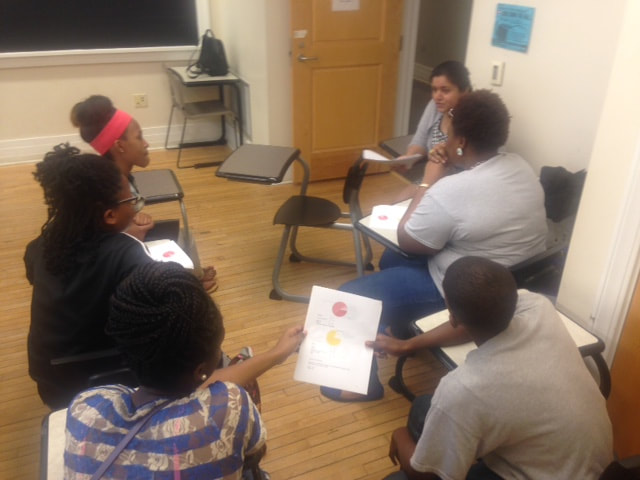The Tools for Change Method & Philosophy
Tools for Change combines moral reasoning with an analytical problem solving method. Moral reflection is focused not on students' opinions, but on how they arrive at these opinions and the principals that guide them. Ethical reasoning is a process.
The process begins with conversations that help students explain, first to themselves and then to each other, how they decide what is right, good, fair, and admirable. Students apply this reasoning and test their ethical principles when they encounter situations at school that challenge their principles. Tools for Change helps students use their ability to reason morally to enrich concepts in Biology and add depth to issues in American history.
TfC is also designed to enable students and their teachers to apply and test their ethical principles outside of school. Ethical reasoning makes community problem solving possible. Our most urgent and pressing problems often have a critical, but unexplored moral dimension.
Ethical self-reflection and the willingness to understand the moral reasoning of others is essential for seeing and framing our most pressing problems, deciding what evidence to collect, how to collect it, and how to make the case for and implement evidence-based policies and practices.
When moral reflection only occurs in the heads of our students or in response to hypothetical dilemmas, students don’t learn that moral reasoning is a lifetime process that allows citizens to work together to decide what laws should govern their community and what kind of society they want to live in. Students develop the Tools for Change civic style by practicing moral reasoning and internalizing a research method to address real challenges in their communities.
Ethical self-reflection and the willingness to understand the moral reasoning of others is essential for seeing and framing our most pressing problems, deciding what evidence to collect, how to collect it, and how to make the case for and implement evidence-based policies and practices.
When moral reflection only occurs in the heads of our students or in response to hypothetical dilemmas, students don’t learn that moral reasoning is a lifetime process that allows citizens to work together to decide what laws should govern their community and what kind of society they want to live in. Students develop the Tools for Change civic style by practicing moral reasoning and internalizing a research method to address real challenges in their communities.
TfC for Middle, High School, and College Students
Students of many ages and backgrounds have been developing this method for more than a decade. Tools for Change is for all middle and high school students, not just the top 10%. Students in rural, urban, and suburban communities on two continents have addressed a range of community challenges—for example, students explored the issues of violence and safety to identify best practices for schools and communities.
TfC has also helped mixed groups of college and high school students at Duke and Rutgers University, Newark analyze community problems, apply new data, and co-produce policy, practice, and innovation in fields such as public transit and education.
Finally, Duke undergraduates have adopted the Tools for Change method to solve problems in research and policy consulting internships in government agencies and NGO's. Tools for Change quite literally develops students who are college ready.
Students of many ages and backgrounds have been developing this method for more than a decade. Tools for Change is for all middle and high school students, not just the top 10%. Students in rural, urban, and suburban communities on two continents have addressed a range of community challenges—for example, students explored the issues of violence and safety to identify best practices for schools and communities.
TfC has also helped mixed groups of college and high school students at Duke and Rutgers University, Newark analyze community problems, apply new data, and co-produce policy, practice, and innovation in fields such as public transit and education.
Finally, Duke undergraduates have adopted the Tools for Change method to solve problems in research and policy consulting internships in government agencies and NGO's. Tools for Change quite literally develops students who are college ready.
TfC and the Kenan Institute for Ethics at Duke University
Tools for Change was developed from the Honors Program in Sociology that Suzanne Shanahan and William Tobin created and led. The TfC method is currently implemented with Duke undergraduates and community college and high school students from Durham in programs at the Kenan Institute for Ethics. These programs share the goal of creating relationships that bring knowledge to bear on society. They include Duke Engage Dublin https://kenan.ethics.duke.edu/dukeengage-dublin/ and the Citizenship Lab
https://sites.duke.edu/citizenshiplab/. Professional instruction on how to teach the TfC method is offered in collaboration with the Institute.
The Kenan Institute for Ethics is an interdisciplinary think-and-do tank committed to promoting moral reflection and commitment, conducting research and shaping policy and practice at Duke and beyond. Kenan works with more than 1500 Duke undergraduates and 150 faculty members from every discipline and school in the University. https://kenan.ethics.duke.edu
Tools for Change was developed from the Honors Program in Sociology that Suzanne Shanahan and William Tobin created and led. The TfC method is currently implemented with Duke undergraduates and community college and high school students from Durham in programs at the Kenan Institute for Ethics. These programs share the goal of creating relationships that bring knowledge to bear on society. They include Duke Engage Dublin https://kenan.ethics.duke.edu/dukeengage-dublin/ and the Citizenship Lab
https://sites.duke.edu/citizenshiplab/. Professional instruction on how to teach the TfC method is offered in collaboration with the Institute.
The Kenan Institute for Ethics is an interdisciplinary think-and-do tank committed to promoting moral reflection and commitment, conducting research and shaping policy and practice at Duke and beyond. Kenan works with more than 1500 Duke undergraduates and 150 faculty members from every discipline and school in the University. https://kenan.ethics.duke.edu

